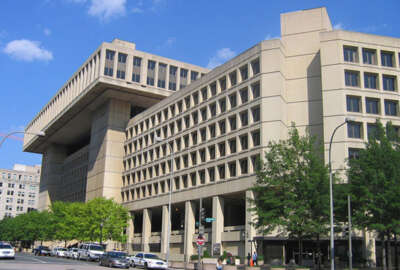

A district court judge has ordered the General Service Administration to release appraisal information about the FBI’s J. Edgar Hoover Building, as well as of...
A district court judge has ordered the General Services Administration to release appraisal information about the FBI’s J. Edgar Hoover Building, as well as offers GSA received for the property.
GSA had previously redacted that information in response to a Freedom of Information Act request filed by Citizens for Responsibility and Ethics in Washington (CREW).
Tuesday’s ruling from D.C. District Court Judge Christopher Cooper followed a ruling he made last December, ordering GSA to do a “more comprehensive search” for FBI headquarters records.
The un-redacted release of GSA’s “findings & determination” document, dated July 10, 2017, may shed further light on the agency’s decision that same day to walk away from plans to move the FBI’s headquarters to a consolidated campus in suburban Maryland or Virginia.
Under the Obama administration, GSA had considered a cash-and-land deal, where the contractor chosen to build a new suburban FBI headquarters would receive appropriated funds and the FBI’s downtown D.C. real estate.
However, GSA in 2017 cited an $822 million funding gap through this arrangement.

GSA estimated that demolishing the Hoover building and building a new FBI headquarters in its place would cost $3.3 billion — $1.9 billion of which would be construction costs alone.
According to Cooper’s legal opinion from Tuesday, GSA argued that releasing the unredacted document could cause “substantial harm to the agency’s bargaining position with any potentially successful offerors to the agency’s future plans for the FBI Headquarters Project.”
GSA, according to the court, had previously redacted the appraisal and offer information from CREW’s FOIA request, under an exemption reserved for “predecisional” documents meant to aid agency officials in making a final decision on an issue.
However, Cooper found “this document was not ‘prepared to aid a decision-maker in arriving at his decision,’ but instead was intended ‘to support a past decision.’”
In his December 2018 ruling, Cooper ordered GSA to broaden its search for documents, beyond the agency’s Office of the Chief Information Officer, and conduct a search of nonelectronic records in fulfilling CREW’s FOIA request.
The court also required GSA to search for the keywords “Hoover building” and “JEH” as part of the FOIA request.
Last May, another district court judge ordered GSA to widen its search for documents related to a FOIA request on the Trump Hotel across the street from the current FBI headquarters building.
The FY 2019 spending package signed by President Donald Trump last month still offers no new funding for a future FBI headquarters, as some lawmakers still have questions about the direction the project has taken.
Members of Congress, in a joint explanatory statement accompanying the spending bill, urged GSA to work with the FBI to submit a new prospectus for “a new, fully consolidated headquarters building,” that meets strict security requirements — and reconsider moving the FBI headquarters to one of three previously vetted sites just outside Washington, D.C.
CREW and GSA didn’t immediately respond to requests for comment Tuesday, but Noah Bookbinder, CREW’s executive director, in a tweet, called the court’s decision an “important ruling.”
Copyright © 2024 Federal News Network. All rights reserved. This website is not intended for users located within the European Economic Area.
Jory Heckman is a reporter at Federal News Network covering U.S. Postal Service, IRS, big data and technology issues.
Follow @jheckmanWFED
